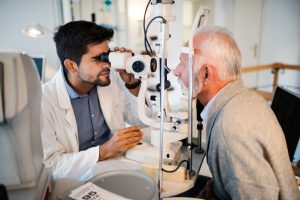5 Glaucoma Risk Factors to Be Aware Of

Glaucoma can cause irreversible vision loss and blindness. This sight-robbing disease has no cure or method of prevention, yet it affects more than 3 million Americans. According to the National Eye Health Education Program, glaucoma’s prevalence will increase by 58 percent by 2030 and affect 4.2 million men, women and children.
January is National Glaucoma Awareness Month, so it’s wise to take some time to learn more about this eye disease and assess your risk. Although anyone can develop glaucoma, you may have an increased chance of developing the disease depending on the following glaucoma risk factors:
Family History of Glaucoma
Heredity is responsible for over half of glaucoma cases, and you are up to ten times more likely to develop glaucoma if you have a sibling with the disease (Glaucoma Research Foundation). If glaucoma runs in your family, encourage family members to make yearly appointments for comprehensive eye exams to detect glaucoma early.
Age
Another glaucoma risk factor is your age. Your chances of developing eye diseases like glaucoma, cataracts and macular degeneration increases with age. If you are over 60 years old, you are six times more likely to develop glaucoma.
Ethnicity and Glaucoma
After cataracts, glaucoma is the most common cause of blindness among African Americans and people of African ethnicity. A study published in JAMA Ophthalmology suggests Mexican Americans may also be at elevated risk for developing primary open-angle glaucoma, the most common form of the disease.
Elevated Eye Pressure
Glaucoma is often associated with elevated intraocular pressure (IOP), or inner eye pressure. You may wonder what normal eye pressure is: the Glaucoma Research Foundation considers normal eye pressure to be 12-22 mm Hg. An ophthalmologist can perform a simple pressure test, known as tonometry, during an eye exam and can advise you as to whether you have elevated IOP. Higher-than-normal eye pressure does not indicate glaucoma, but it is a primary glaucoma risk factor.
Glaucoma Eye Exams Preserve Vision
Because glaucoma symptoms and warning signs are rare, it is essential to see your eye doctor regularly. If you have a family history of glaucoma, you will need to schedule your appointments more frequently. Knowing your risk for glaucoma and scheduling comprehensive eye exams are integral to preserving your vision for years to come. Because glaucoma-related vision loss is irreversible, glaucoma treatments like eye drops, laser procedures and surgery are more effective in the early stages of the disease.
During your eye exam, ask your doctor to review your complete medical history with you so you can make updates or changes. Be sure to include family medical history, and mention any chronic diseases like hypertension, diabetes or heart disease, as well as any eye diseases that run in your family.
Schedule an appointment for yourself and your entire family during National Glaucoma Awareness Month and enjoy the gift of clear vision.
